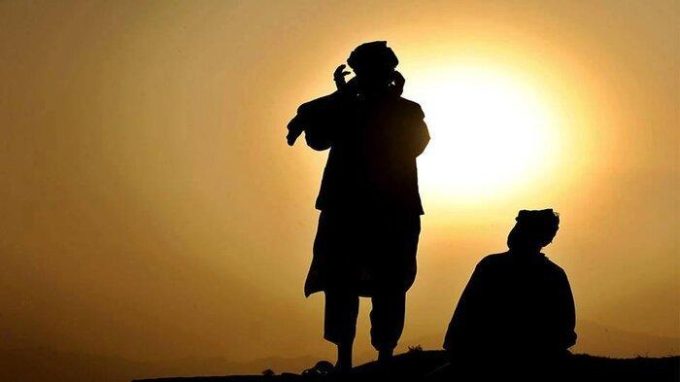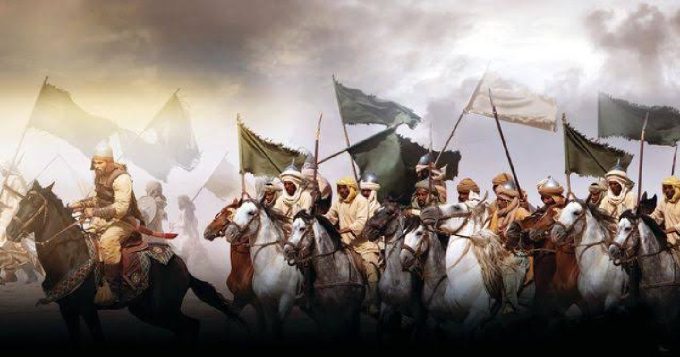Utsman Bin Affan – Prophet Muhammad SAW is a human figure who is most loved by all his people but not only among his people, his family and friends also love him very much. As a friend who lived at the same time as the prophet and spent his days with the prophet, of course the nature and character of a friend of the prophet is not much different from the noble morals of the prophet himself.
Of the several friends of the prophet that we know, one of them who once became a caliph replacing the leadership after the prophet’s departure was Utsman Bin Affan. He was the third caliph after Abu Bakar and Umar Bin Khattab who rose to continue the just and prosperous government.
Emulating his figure is certainly very good because he is also known to have a good role model and is worthy of being emulated by the next generation, especially Muslims throughout the world.
For that, it is good for us to emulate his story in this discussion which will summarize his life journey as a caliph and friend of the prophet Muhammad SAW.
Next, the discussion regarding Utsman Bin Affan can be seen below!
Biography of Uthman Bin Affan
‘Uthman bin’ Affan June 17, 579 AD was the third Caliph who ruled from 644 AD to 656 AD and was the longest-ruling Caliph of the Rasyidin. Like his two predecessors, ‘Uthman was one of the main companions of the Prophet Muhammad. His successive marriages with the two daughters of the Prophet Muhammad and Khadijah earned him the nickname Dzun Nurain (holder of the two lamps).
During his reign, the Muslim government expanded its territory to Fars (now Iran) in 650 and part of Khorāsān (now Afghanistan) in 651. The conquest of Armenia had begun in the 640s. Uthman bin Affan bin Abi Al-Ash bin Umayyah bin Abdu Shams bin Abdu Manaf bin Qushay bin Kilab.
Uthman was born to a father named Affan bin Abi al-‘As, from the Umayyad tribe, and to a mother named Arwa bint Kurayz, from Abd Shams, a wealthy and respected Quraysh tribe in Mecca. Uthman had a younger sister, Aminah. Uthman was born in Ta’if.
He is listed as one of the 22 Meccans who could write. His father, Affan, died at a young age while traveling abroad, leaving an important inheritance for Uthman. He became a trader like his father, and his business flourished, making him one of the richest people among the Quraysh tribe.
Uthman bin Affan was a friend of the Prophet and also the third Caliph of the Rashidun Khulafaur. He was known as a wealthy and reliable businessman in the field of economics but very generous. He greatly helped the economy of the Muslim community in the early days of Islamic da’wah. He was nicknamed Dzun Nurain which means one with two lamps. This nickname was obtained because Utsman married the second and third daughters of the Prophet ﷺ Ruqayyah and Umm Kulthum.
Uthman bin Affan was born in 574 AD from Bani Umayyah. His mother’s name was Arwa binti Kuriz bin Rabiah. He converted to Islam at the invitation of Abu Bakr and was included in the As-Sabiqun al-Awwalun group (the first group to convert to Islam). The Prophet ﷺ himself described Utsman bin Affan as the most honest and humble Muslim. Imam Muslim narrated that Aisha asked the Prophet ﷺ, “Abu Bakr came in but you were normal and did not pay attention to him, then Umar also came to you normally and did not pay special attention. But when Utsman came in, you kept fixing your clothes, what’s wrong?” The Messenger of Allah replied: “Am I not ashamed of those who even the angels are ashamed of?”
During the Dzatirriqa War and the Ghatfahan War, in which the Messenger of Allah ﷺ raised the banner of war, Uthman was believed to be the mayor of Medina. During the Battle of Tabuk, Uthman donated 950 camels and 70 horses, plus a personal donation of 1,000 dirhams for the Battle of Tabuk, which was one-third of the cost of the war. Uthman bin Affan also showed his generosity by buying a spring called Rumah from a man from the Ghifar tribe for 35,000 dirhams.
He dedicated water resources for the benefit of the community. During the reign of Abu Bakr, Uthman also donated wheat transported by 1000 camels to help the needy during the dry season.
He was the first king to expand the Grand Mosque in Mecca and the Prophet’s Mosque in Medina as more and more Muslims practiced the fifth pillar of Islam (hajj). He created the idea of a security policy for his people; the construction of special buildings for courts and decisions that were previously carried out in mosques; developing agriculture, conquering several small areas around the borders such as Syria, North Africa, Persia, Khurasan, Palestine, Cyprus, Rhodes, and forming a strong navy.
His greatest work was when he implemented the policy of collecting the Qur’an in a mushaf. During his tenure, Utsman replaced many unworthy or incompetent regional governors and replaced them with more trustworthy ones.
The Beginning of Converting to Islam
When the Prophet Muhammad SAW received revelation and preached Islam, Abu Bakr became the first person to convert to Islam. After a business trip to Syria in 611 AD, Abu Bakr came to Uthman bin Affan to invite him to convert to Islam. Uthman decided to convert to Islam and was then taken by Abu Bakr to meet the Prophet Muhammad to declare his faith.
In this way, Uthman became one of the first people to convert to Islam, after Ali, Umar, Abu Bakr and several others. Since then, he has remained loyal to the Prophet Muhammad SAW and has become one of the Prophet’s main companions. After accepting the invitation to migrate to Medina, Uthman became one of the people who departed and accompanied the Prophet Muhammad SAW to spread Islam until the end of the Prophet’s life.
Uthman accepted Islam easily, because he had a vision like a dream when he returned from Syria. As he struggled to fall asleep, Uthman heard a voice calling: “O you who are sleeping, wake up because Muhammad has appeared in Mecca,” he said.
Until his return, he had never heard of the new religion. Uthman contacted Abu Bakr, who told him that he had sworn allegiance to the Prophet Muhammad and had accepted the new religion. Then he took Uthman to meet the Prophet Muhammad.
Uthman listened to the story of the Prophet Muhammad’s experiences and the circumstances under which his prophethood was revealed. He immediately accepted Islam and then moved very easily in the circle of the Prophet Muhammad’s companions.
When the message of the Prophet Muhammad reached the public, it threw Mecca into chaos. Many leaders feared losing money. His message that was only for God meant that the entry of pilgrims to the Kaaba to worship many idols would now slow down or even stop.
Challenges after embracing Islam
As the ranks of the Prophet Muhammad’s followers grew, the Quraysh began a campaign of persecution and harassment against the new Muslims. The Quraysh were ready to fight to protect their idols and also to protect their economic and social way of life. The campaign quickly escalated into violence and harassment and even their own family members were not safe.
Uthman’s acceptance of Islam caused a backlash in his own family. Uthman’s father had died but his uncle tried to restrain Uthman. He tied his hands and feet and locked him in a cupboard.
His mother and uncle wanted him to renounce Islam, but he refused. Uthman also faced difficult choices in his marriage. His wives refused to accept Islam and despite his attempts to convince them of the beauty of Islam, he eventually had to divorce them.
Becoming a Caliph
When the Prophet Muhammad SAW died in 632, Abu Bakr became the caliph who ruled over the Muslims. During this time, Uthman bin Affan and his friends became the main advisors to Abu Bakr’s government. After Abu Bakr’s death in 634, Umar bin Khattab replaced him until his death in 644.
After Umar served as the second Caliph Rasyidin, Uthman remained in Medina to run his business and participate in the government. He experienced various events, until Umar bin Khattab died because he was killed by Abu Lu’luah.
After that, a discussion was held to elect the next caliph. There were six candidate caliphs proposed, namely Ali bin Abi Thalib, Uthman bin Affan, Abdurrahman bin Auf, Sa’ad bin Abi Waqqas, Zubair bin Awwam and Thalhah bin Ubaidillah. However, Abdurrahman bin Auf, Sa’ad bin Abi Waqqas, Zubair bin Awwam and Talhah bin Ubaidillah resigned, leaving Uthman and Ali alone.
After a poll, the majority wanted Uthman to replace Umar as the third king. So in the month of Muharram 23 H or 644 AD, Uthman bin Affan became caliph at the age of 70.
The Reign of Uthman Bin Affan
One of the things that Uthman bin Affan did during his time as caliph was to expand his territory and establish a navy. His government succeeded in controlling Barqah, West Tripoli, the southern part of the Nubah country in Africa, Armenia, Tabaristan, Amu Darya, Balkha, Harah, Kabul, Haznah in Turkistan in Asia and Cyprus in Europe. Uthman also divided the Muslim kingdom into ten provinces with an emir or governor in each.
Under his rule, Muslims experienced a period of greatest prosperity and prosperity. It is said that people could go on the hajj more than once. Uthman also built police and courts that always stood in former mosques. Uthman’s most brilliant achievement was the compilation of the Qur’an which was then reproduced and sent to Mecca, Syria, Basrah, Kufa, and Medina.
End of the Reign
Uthman bin Affan ruled for two terms, each lasting six years. However, during his second reign, there was division and rebellion because strategic positions in the government were given to his family by the Umayyads. In 35 AH or 655 AD, around 1,500 people came to Medina to protest Uthman’s policies.
However, because they did not receive a response, the protest turned into a rebellion that overthrew his regime. Uthman was surrounded by these troops, but refused to fight because he did not want bloodshed among his Muslim brothers. Caliph Uthman bin Affan died in 656 after a rebel named Al-Gafiqi managed to enter through the roof and found his room. The cause of Uthman bin Affan’s death was a blow to the head.
The Exemplary Behavior of Utsman bin Affan
Here are 5 examples of the exemplary behavior of Utsman bin Affan:
1. Caring for religion and people
Uthman bin Affan is said to be the third caliph after the death of ‘Umar bin Khattab. Utsman bin Affan was chosen because of his noble and sincere attitude and behavior in his efforts to develop Islam.
After becoming Caliph, he did a lot to advance Islam. One of his services was establishing a group of Al-Quran publishers chaired by Zaid bin Tsabit. This was because of his interest in Muslims about how to read the Qur’an because the existing texts did not have a sequence and there were disputes about how to read them.
The first step was to collect the Al-Quran manuscripts that were in the community. Because the Al-Quran manuscripts in the community may not be in accordance with the truth. The next task was to copy and compile the Qur’an manuscripts that were related to the manuscripts kept by Hafsah binti Umar which were still well and correctly maintained. The Qur’an that was recorded or published was then called “Mushaf Al-Imam” or Mushaf Uthmaniyah to be used as a guideline in reading the Qur’an correctly.
2. His generosity
Uthman bin Affan was known as a generous figure. During the time of Caliph Abu Bakr, the city of Mecca was hit by famine due to a prolonged dry season. When Uthman came from the land of Syam, a trade caravan came with 1000 camels carrying food. Before entering the city, Uthman’s group was stopped by Meccan traders to buy all of Uthman’s belongings in exchange for a large profit. However, Uthman was not tempted at all because he intended to give all the goods he brought to the poor.
3. Courage
Caliph Uthman bin Affan was fearless in the face of 120,000 Roman soldiers in North Africa who were fully equipped for war. When the Islamic territory expanded and many areas were surrounded by seas, to protect Muslim territories from enemy attacks, Caliph Uthman established a fleet and naval forces. Islam always won in sea battles.
4. Simple and Humble
Uthman bin Affan was considered a wealthy person, but he did not live in luxury. His behavior in life was simple and unobtrusive, such as dressing, eating, and living.
Syurahbil bin Muslimin reported that “Uthman used to eat delicious food as usually served by the rulers, but at home he used to eat bread with vinegar or oil.”
5. Firm in faith
After hearing that Uthman bin Affan converted to Islam, his uncle Al Hakam bin Abil Ash was very angry. Uthman was tied up and beaten many times to return to his ancestral religion. However, Uthman remained firm in his beliefs and would not leave the religion taught by the Prophet no matter what. Year
When his uncle discovered Uthman’s unshakable beliefs and was unable to force him to return to his ancestral beliefs, Al Hakam finally freed Uthman bin Affan
Conclusion
That’s a brief discussion about the biography of Utsman Bin Affan. Not only discussing the biography of Utsman Bin Affan but also discussing his career journey and emulating his traits that are worthy of being an example.
Getting to know the figure of Utsman Bin Affan gives us an idea that there is a human figure who is so good in character after the departure of the Prophet Muhammad SAW who gives us the opportunity to be part of that good person and provide good life lessons for the next generation.
That’s a review of Utsman Bin Affan. For Grameds who want to know more about the figure of Utsman Bin Affan and other knowledge related to Islamic history, you can visit Gramedia.com to get related books.
Source : gramedia.com











Leave a comment